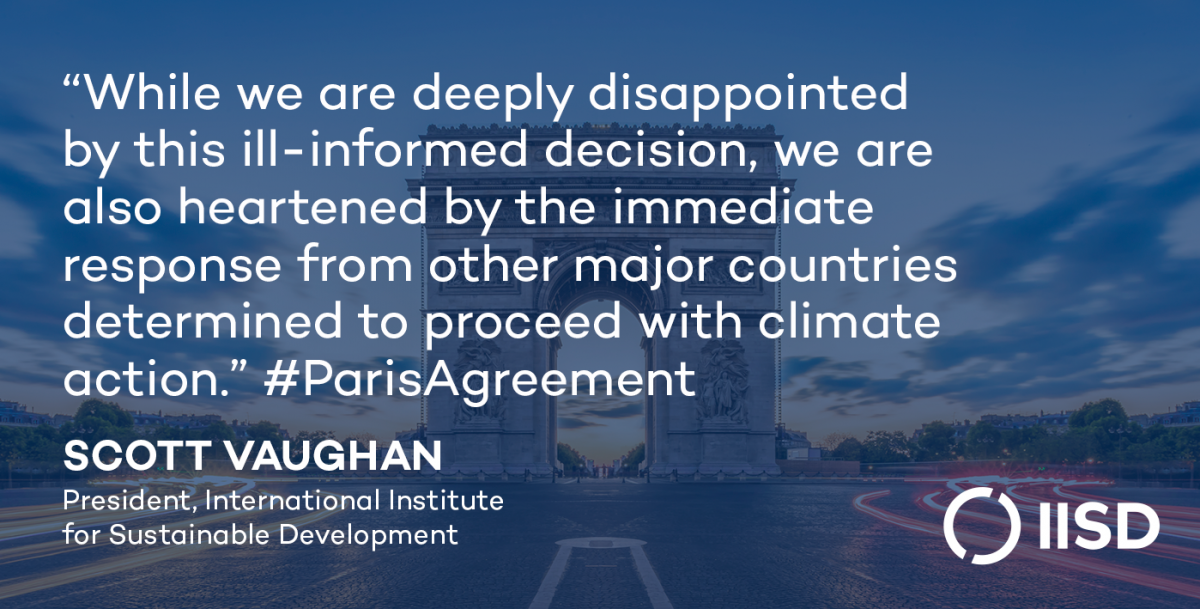Trump’s rejection of Paris Agreement is a call to action and resolve for us all
"U.S. President Donald Trump’s withdrawal from the Paris Agreement on climate change puts the United States at odds not just with the international community, but with overwhelming scientific evidence and the publicly expressed wishes of hundreds of American companies, from Apple to Exxon. U.S. President Donald Trump’s withdrawal from the Paris Agreement on climate change puts the United States at odds not just with the international community, but with overwhelming scientific evidence and the publicly expressed wishes of hundreds of American companies, from Apple to Exxon."
U.S. President Donald Trump’s withdrawal from the Paris Agreement on climate change puts the United States at odds not just with the international community, but with overwhelming scientific evidence and the publicly expressed wishes of hundreds of American companies, from Apple to Exxon.
Without the United States, the rest of the world will have a harder time meeting the Paris Agreement’s goal of preventing global temperatures from rising more than 2 degrees Celsius above pre-industrial levels. And the United States will miss out on the creation of more jobs and economic growth as well as reduced business risks.
While we are deeply disappointed by this ill-informed decision, we are also heartened by the immediate response from other major countries determined to proceed with climate action. India, the European Union and China pledged to accelerate their efforts. Canada announced it will co-host a ministerial summit with China and the European Union in September to advance action on the Paris Agreement.

Even more importantly, new coalitions of states, cities and businesses within the United States have emerged in defiance of the president's decision.
Governors from California, New York and across the country declared they would work together to move ahead with climate action. Yesterday, 83 mayors signed a statement vowing to uphold the commitments to the goals enshrined in the Paris Agreement.
And finally, U.S. businesses have expressed their frustration and disappointment with the decision, but also stressed that it would have little impact on their own ongoing efforts. Brad Smith, CEO of Microsoft, said this about the Paris Agreement: "A global framework strengthens competitiveness for American businesses. It creates new markets for innovative clean technologies, from green power to smart grids to cloud-enabled solutions."
At IISD we will continue to work across the world and in the United States at every level of government to help implement climate action. We echo the words of the 83 U.S. mayors who committed to adopting and upholding the Paris Climate Agreement goals:
“The world cannot wait—and neither will we.”
About IISD
The International Institute for Sustainable Development (IISD) is an award-winning independent think tank working to accelerate solutions for a stable climate, sustainable resource management, and fair economies. Our work inspires better decisions and sparks meaningful action to help people and the planet thrive. We shine a light on what can be achieved when governments, businesses, non-profits, and communities come together. IISD’s staff of more than 250 experts come from across the globe and from many disciplines. With offices in Winnipeg, Geneva, Ottawa, and Toronto, our work affects lives in nearly 100 countries.
You might also be interested in
December 2024 | Carbon Minefields Oil and Gas Exploration Monitor
In November 2024, 23 oil and gas exploration licences were awarded across five countries, with Russia granting the licences that account for the largest portion of embodied emissions.
Increased Support Needed to Achieve India's Clean Energy Goals
India is on track to achieve many of its 2030 clean energy goals but needs to step up government support measures to accelerate the deployment of offshore wind, electric vehicles, and green hydrogen, according to a new report.
Budgeting for Net Zero
This study estimates the cost gap for battery energy storage systems (BESSs), offshore wind, solar photovoltaic (PV), electric vehicles (EVs), and green hydrogen (GH2) to inform government support.
Artisanal and Small-Scale Mining of Critical Minerals
This report examines the potential for artisanal and small-scale mining (ASM) to take an expanded role in the global supply of critical minerals.